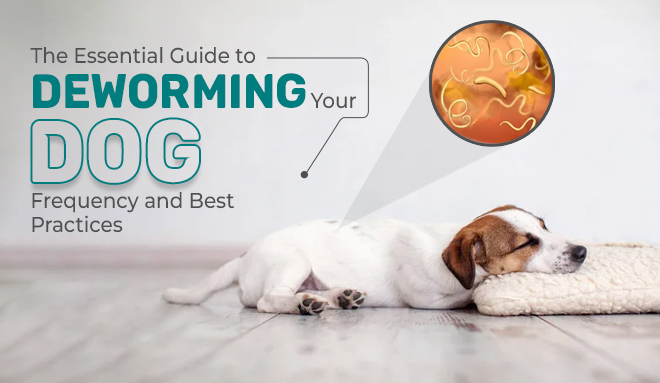Dogs are vulnerable to a range of parasites and intestinal worms, which pose serious health risks. As a dog parent, you must be aware that protection against worms is especially crucial. Moreover, it’s a little tricky because, unlike fleas and ticks, these parasites often go under the radar as they are not visible to the naked eye.
Understandably, many dog parents feel a little perplexed when it comes to protecting dogs against worms, as there’s confusion surrounding deworming frequency and schedules.
Don’t fret! In this blog, we’ll resolve all the confusion about deworming in dogs, covering common symptoms and how often it should be done. Moreover, we’ll cover safe and effective practices to prevent worm infections along with some popular deworming treatments.
Let’s get started!
Why is Deworming in Dogs So Crucial?
Your dog is susceptible to the dangers of various parasites, and worms are especially dangerous. If left untreated, they can lead to various health issues ranging from discomfort to severe consequences such as organ failure or death. They are more than just a nuisance, silently wrecking your dog’s health. Therefore, look out for the following symptoms so that you can take timely action:
- Diarrhea
- Vomiting
- Lack of appetite
- Weight loss
- Lethargy
- Itching
- Visible worms in feces or vomit
The frequency of deworming in dogs can vary depending on different factors such as age, health status, lifestyle, or the type of treatment used.
How Often Do Dogs Need to Be Dewormed?
The following segment will give you the general idea about the frequency of deworming in dogs:
- Puppies (2 – 12 weeks of age group): Every 2 weeks.
- Puppies (3 – 6 months of age group): Every month.
- Adult Dogs (6 months & older age group): Every 3 to 6 months.
- Senior Dogs: Every 3 to 6 months.
- Indoor Dogs: Every 3 to 6 months.
Do’s and Don’ts of Deworming in Dogs
Now that you have an idea about the frequency of deworming, let’s understand the do’s and don’ts you must keep in mind:
Do’s
- When you notice worms (dead or alive) in your dog’s stool, collect a feces sample.
- Visit the vet for a check-up and a fecal examination.
- Administer the vet-recommended deworming treatment as per the correct deworming schedule.
- Practice good hygiene and limit parasite exposure.
Don’ts
- Don’t skip deworming, as it can lead to fatal worm infections.
- Don’t use expired treatments, as they may cause adverse reactions.
- Don’t administer the treatments on your own and always rely on professional advice.
- Don’t ignore potential symptoms and side effects.
Valuable Tips to Prevent Worms in Dogs
Here are some preventive measures you can take to protect your canine companion against the dread of intestinal worm infections:
- Visit the vet regularly and take follow-ups.
- Regularly groom your dog.
- When going out for walks, avoid heavily wooded areas.
- Make sure you provide a clean environment for your pet.
- Pick up the feces as soon as possible.
- Use deworming treatment recommended by the vet.
Popular Deworming Treatments
Beyond the preventive measures, you can look into the following deworming treatments for your beloved dog:
Triworm-D:
Triworm-D is an oral deworming treatment formulated to treat and control intestinal worms in puppies and adult dogs.
- Active ingredients: Praziquantel, Pyrantel pamoate, and Febantel.
- Recommended for: All dogs, including puppies, adults, and old dogs.
- Treats and controls: Ascarids, hookworms, whipworms, and tapeworms.
Milpro Allwormer:
It’s a broad-spectrum wormer for puppies and adult dogs. Milpro Allwormer liver-flavor film-coated tablets offer protection against a wide range of internal worms.
- Active ingredients: Praziquantel and Milbemycin Oxime
- Recommended for: Dogs and puppies from 2 weeks of age and weighing at least 1.1 lbs.
- Treats and controls: Roundworms, whipworms, hookworms, and tapeworms (including hydatids), and prevents heartworm disease.
Panacur Granules:
Panacur Granules is a multi-spectrum wormer to protect dogs and puppies against a range of gastrointestinal worms.
- Active ingredients: Fenbendazole
- Recommended for: Puppies and dogs.
- Treats and controls: Roundworms, hookworms, whipworms, and tapeworms.
Parting Words
We hope this blog was able to fill the gap in your knowledge about deworming in dogs. Keep in mind the information shared so you can take calculated measures directed toward your beloved pet’s well-being.
The deworming treatments discussed in this blog are really effective in protecting dogs against worms. However, it’s always best to rely on professional advice. So, consult your vet to get personalized treatment recommendations and a suitable deworming schedule.


One thought on “The Essential Guide to Deworming Your Dog: Frequency and Best Practices”
Comments are closed.